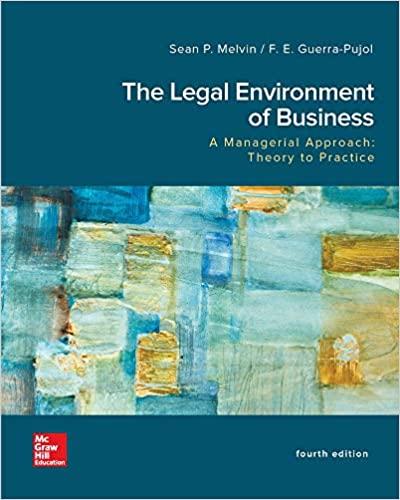A business may be engaged in hundreds of relatively low-cost transactions per year with various out-of-state vendors
Question:
A business may be engaged in hundreds of relatively low-cost transactions per year with various out-of-state vendors such as suppliers, shipping companies, office supply stores, contractors, and the like. When disputes arise, a business may be at a distinct disadvantage and bargaining position because the amount in controversy is too low to justify even the least-expensive form of alternative dispute resolution. However, over an extended period of time, these small losses add up to unnecessary liabilities, leaving managers with a difficult choice when faced with a dispute over a relatively low amount of money with an out-of-state vendor: (1) invest in a dispute resolution method despite the fact that the costs may very well exceed the benefits in that particular dispute or (2) allow the losses to accumulate and potentially seek favorable tax treatment for writing off bad debt.
Businesses are now capable of making small purchases from vendors across the globe and can do so quickly and conveniently. This renders traditional forms of ADR impracticable, given the reluctance to pay for an arbitrator or attorney and the fact that traveling to another location to settle a dispute often returns a sum less than the costs of travel. Online dispute resolution (ODR) has all of the advantages of traditional forms of ADR: The parties in question can avoid the expense and publicity of trial plus an agreement is usually reached much faster.
Online technology is ideal for low-cost transactional disputes such as a party seeking a refund for a defective product. Often these types of issues can be resolved using the technology alone. For example, blind-bidding sites like ClickandSettle.com and Cybersettle.com offer an automated service where parties individually enter the price they’re willing to pay or receive. The software evaluates these numbers and then sends each party a fair price based on their initial demand.
Another form of ODR is more geared toward complex transactions. For example, Square Trade proposes prewritten resolutions. For example, if you received a damaged shipment of goods, Square Trade offers a standard menu of solutions such as (1) replacement with an undamaged good, (2) return for a full refund, or (3) keeping the merchandise with a partial refund. The parties may also fill in their own solution, but this guided approach helps the parties focus on a resolution to the dispute.
Option 1: Online Mediation. Online mediation is a logical first step to settling disputes. Like traditional of mediation, online mediation is generally nonbinding. Parties present their positions to a mediator who considers their arguments and attempts to negotiate a settlement. An advantage to online mediation is that dialogue is carried out via e-mail so participants can submit responses at their convenience and can think out their replies rather than engage in what may be an antagonistic live hearing.
Option 2: Online Arbitration. Online arbitration is similar to traditional arbitration, except that all communications take place using the Internet. The arbitrator convenes the arbitration via live webcast and issues a decision based on the evidence presented. In an online setting, all communications, including the presentation of evidence, is supplied in electronic form: text, image, audio, or video. Participants in online arbitration agree in advance to abide by the arbitrator’s decision, and that the award may be enforced by an appropriate court. Following completion of the online arbitration, each participant typically completes a brief evaluation of the arbitrator and the process.
CRITICAL THINKING QUESTIONS
1. Use your favorite search engine to look up some online dispute firms. Are they competitively priced? Would it be more or less than filing a case in person?
2. Is it possible that even virtual ADR may be biased toward one side or the other? Explain.
3. Ultimately, doesn’t online ADR depend on good faith of the parties? If one party refuses to abide by the decision, how do online ADR providers ensure that the parties abide by the rules?
Step by Step Answer:

The Legal Environment Of Business A Managerial Approach Theory To Practice
ISBN: 9781260247800
4th Edition
Authors: Sean Melvin, Enrique Guerra-Pujol





